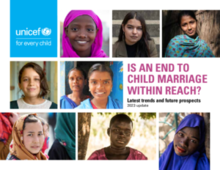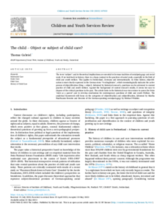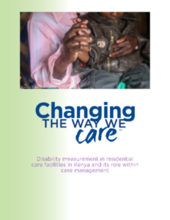Displaying 1031 - 1040 of 14551
The practice of child marriage has continued to decline globally. Today, one in five young women aged 20 to 24 years were married as children versus nearly one in four 10 years ago.
GH-TAMS is seeking candidates for a Children in Adversity Strategy Update consultant for a five-month assignment with USAID/Washington DDI/ID. The consultancy will be Mostly virtual, occasional in-office meetings at 68 days of effort. Start date is approximately May 15, 2023.
This paper is a first approach to pursuing questions of subjectification and objectification in the context of children and youth growing up in care settings in Switzerland.
Though research has been conducted on children with disabilities and on children in residential care settings, the intersections of these two topics has yet to be explored in depth. Notably, there is a lack of information surrounding disability measurement within residential care settings, highlighting a gap in the literature. It is estimated that a child with a disability is 17 times more likely to be placed in an institutionalized care setting than a child without a disability, and girls are more likely to be placed in an institution than boys. This report details research conducted in Kenya.
Following the release on May 3 of UNICEF’s new global estimates on child marriage, UNICEF invites you to a webinar where they will present key facts and discuss implications. Join the webinar to learn how many girls and women are affected by the practice, which parts of the world have made progress, and how gains could be offset by the polycrisis.
ASTANA – Kazakhstan is developing a draft law on the introduction of professional foster families, which would mean all orphans and children left without parental care will be placed in foster care immediately.
Drawing from the learning from participatory research in Latin America and the Caribbean as well as Australia, this webinar introduced different approaches used to engage individuals with lived experience of alternative care in research efforts.
Drawing from the learning from participatory research in Latin America and the Caribbean as well as Australia, this webinar will introduce different approaches used to engage individuals with lived experience of alternative care in research efforts and highlight some of the key findings and lessons for meaningful and effective engagement.
The Alliance for Child Protection in Humanitarian Action , with the support of the Inter-Agency Network for Education in Emergencies, conducted participatory research to explore the impact of COVID-19 related school closures on children and young people in three humanitarian settings: Lebanon, Democratic Republic of Congo and Colombia.
This is the fourth webinar in the Family for Every Child's kinship care learning series which explored the different types of kinship caregivers (e.g. grandparents, siblings, aunts and uncles, male kinship carers, friends of the family) and how their different characteristics impact the risk and support needs of kinship care placements.



